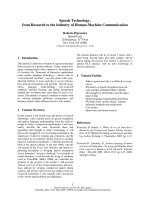From Nuremberg to The Hague - The Future of International Criminal Justice Part 6 doc
Bạn đang xem bản rút gọn của tài liệu. Xem và tải ngay bản đầy đủ của tài liệu tại đây (84.71 KB, 21 trang )
of New York in Hatch v. Baez.
43
That court was faced with
a claim from a plaintiff, Mr Davis Hatch, that he had
suffered injuries in the Dominican Republic as a result of
acts done by the defendant,Mr Buenaventura Baez,in his
official capacity of President of the Dominican Republic.
When Mr Hatch learnt that former President Baez was
present in New York he brought proceedings. The court
found that it could in principle exercise jurisdiction,
given the defendant’s presence in New York.But it ruled in
favour of the defendant’s claim to immunity from its
jurisdiction on the grounds that such immunity was
‘essential to preserve the peace and harmony of nations’,
because the acts alleged sprang from the capacity in which
the acts were done, and because they emanated from a
foreign and friendly government.
44
The decision was
unexceptional,based on a traditional judicial respect for
the sovereignty of a foreign state.
The approach reflected in the 1876 decision was
broadly followed by the court of first instance in the
Pinochet case, which upheld Senator Pinochet’s claim to
immunity.
45
On appeal to the House of Lords in
November 1998,however,that ruling was overturned by
90
43
Hatch v. Baez, 7 Hun 596 (NY 1876).
44
Ibid., p. 600.
45
Re Augusto Pinochet Ugarte, UK High Court of Justice, Queen’s
Bench Division (Divisional Court), 28 October 1998, (1999) 38
ILM 68.
three votes to two, on the ground that customary inter-
national law provided no basis to uphold the claim to
immunity.
46
The significance of the ruling was evident
from the fact that it made front-page news around the
world, most of which was positive.
47
That judgment of
the House of Lords was later annulled for other reasons,
After Pinochet: the role of national courts 91
46
R. v. Bow Street Metropolitan Stipendiary Magistrate, ex parte
Pinochet Ugarte [2000] 1 AC 61.
47
For an example of the reaction in the press, see Warren Hoge,
‘British Court Rules Against Pinochet:Now Cabinet Must Weigh
Extradition’, New York Times, 26 November 1998, p. A1; Kenneth
Roth,‘Justice for Tyrants’,Washington Post,26 November 1998,p.
A31; ‘Pinochet: le Jour où la Peur a Changé de Camp’, Le Monde
(Paris), 27 November 1998,p.1;Guy Duplat,‘Un début de Justice’,
Le Soir (Brussels), 26 November 1998, p. 1; Nick Hopkins and
Jamie Wilson, ‘Judgment Day Beckons’, Guardian (London), 26
November 1998, p. 1; Paola Sais, ‘Pinochet sin immunidad’, La
Tercera (Santiago, Chile), 26 November 1998; and ‘Un hito en la
defensa de los derechos humanos’, El Mundo (Madrid), 26
November 1998. See also the numerous subsequent law review
articles, for example, Michael Byers,‘The Law and Politics of the
Pinochet Case’ (2000) 10 Duke Journal of Comparative and
International Law 415, available at www.law.duke.edu/jour-
nals/djcil/articles/djcil10p415. htm; Roland Bank, ‘Der Fall
Pinochet: Aufbruch zu neuen Ufern bei der Verfolgung von
Menschenrechtsverletzungen?’ (1999) 59 Zeitschrift fum ur
auslum andisches um offentliches Recht und Vum olkerrecht 677;
Andrea Bianchi,‘Immunity Versus Human Rights: The Pinochet
Case’ (1999) 10 European Journal of International Law 237; Neil
Boister and Richard Burchill,‘The Implications of the Pinochet
Decisions for the Extradition or Prosecution of Former South
African Heads of
State for Crimes Committed Under Apartheid’
(1999) 11 African Journal of International and Comparative Law
619; Michel Cosnard,‘Quelques Observations Sur les Décisions de
but there followed a further judgment which made a
similar finding, although on narrower grounds, namely,
that the loss of immunity arose not under customary
international law, but rather from the coming into force
in late 1988 of the 1984 Convention Against Torture,
48
to
which Chile, Spain and the United Kingdom were all
parties.
49
The fact that the majority of the House of Lords
92
la Chambre des Lords du 25 novembre 1998 et du 24 mars 1999
dans l’Affaire Pinochet’ (1999) 103 Revue Générale de Droit
International Public 309; Hazel Fox, ‘The First Pinochet Case:
Immunity of a Former Head of State’(1999) 48 International and
Comparative Law Quarterly 207; and Jill M. Sears,‘Confronting
the “Culture of Impunity”: Immunity of Heads of State from
Nuremberg to Ex parte Pinochet’ (1999) 42 German Yearbook of
International Law 125.
48
Note 34 above. For more information on the Convention, see
Herman Burgers and Hans Danelius, The United Nations
Convention Against Torture: A Handbook on the Convention
Against Torture and Other Cruel, Inhuman, or Degrading
Treatment or Punishment (1988); Roland Bank, Die interna-
tionale Bekum ampfung von Folter und unmenschlicher
Behandlung auf den Ebenen der Vereinten Nationen und des
Europates: eine vergleichende Analyse von Implementation und
Effektivitum at der neueren Kontrollmechanismen (1996); and
Roland Bank, ‘International Efforts to Combat Torture and
Inhuman Treatment: Have the New Mechanisms Improved
Protection?’ (1997) 8 European Journal of International Law 613.
49
Chile became a party on 30 Sept
ember 1988; Spain became a
party on 21 October 1989; the United Kingdom became a party
on 8 December 1988. See United Nations,‘Status of Multilateral
Treaties Deposited with the Secretary-General’, at http://
untreaty.un.org/english/bible/englishinternetbible/partI/chapt
erIV/treaty12.asp.
relied on the 1984 Convention indicated a desire to
respect state sovereignty as expressed through the
consent to be bound by the Convention; the difficulty
with this approach, as Lord Goff recognised in his lone
dissent, was that the 1984 Convention was silent about
immunity,and on that basis a loss of immunity could not
be presumed.
50
But Lord Goff was unable to persuade his
fellow judges to take the traditional approach, and six of
the seven Law Lords ruled against the claim to immunity.
The ruling of the House of Lords was a landmark,
and has been recognised as such. First, the majority
judgments recognised the legitimate role which
national courts are to play in the prosecution of those
international crimes which are outlawed by instru-
ments such as the Torture Convention and the other
conventions mentioned earlier in this lecture. Secondly,
it recognised and gave effect to the underlying policy of
those conventions, which establishes the principle of
universal jurisdiction over such crimes. Thirdly, it
recognised that the grant of immunity to a former head
of state would be incompatible with the objectives of
the Torture Convention, and that a proper interpreta-
tion of the Convention required a rejection of immu-
nity. And, fourthly, it underscored the point that the
After Pinochet: the role of national courts 93
50
R. v. Bow Street Metropolitan Stipendiary Magistrate, ex parte
Pinochet Ugarte (No. 3) [2000] 1 AC 147 at 215 per Lord Goff.
commission of an international crime can never be an
official function. As Lord Browne-Wilkinson put it:
Can it be said that the commission of a crime which
is an international crime against humanity and jus
cogens is an act done in an official capacity on
behalf of the state? I believ
e there to be strong
ground for saying that the implementation of
torture as defined by the Torture Convention
cannot be a state function.
51
And Lord Phillips was unable to identify a rule of
immunity upon which Senator Pinochet could rely:
I reach that conclusion on the simple basis that no
established rule of international law requires state
immunity ratione materiae to be accorded in
respect of prosecution for an international crime.
International crimes and extra-territorial
jurisdiction in relation to them are both new
arrivals in the field of public international law. I do
not believe that state immunity ratione materiae
can co-exist with them. The exercise of extra-
territorial jurisdiction overrides the principle that
one state will not intervene in the internal affairs of
another. It does so because, where international
crime is concerned, that principle cannot prevail.
An international crime is as offensive, if not more
offensive, to the international community when
committed under colour of office. Once extra-
territorial jurisdiction is established, it makes no
94
51
Ibid., p. 203 per Lord Browne-Wilkinson.
sense to exclude from it acts done in an official
capacity.
52
The judgment of the House of Lords opens the door
to the use of a national court to prosecute an individual
– even a former head of state – for acts occurring in
another state. It provides strong support for the poten-
tial role of national courts, against the background of
the principle of ‘complementarity’ found in the Statute
of the ICC. But the judgment of the House of Lords has
also given rise to a vibrant debate on the circumstances
in which jurisdiction of a national court may be
claimed and then exercised. There is, in particular,
concern that inroads into the traditional immunities of
foreign sovereigns might undermine the ability of states
to interact, especially where traditional immunities are
challenged in respect of serving heads of state or other
officials.
The World Court steps in
Our story now turns away from a national court to
another international court in The Hague, the
International Court of Justice (the ICJ, sometimes
After Pinochet: the role of national courts 95
52
Ibid., p. 289 per Lord Phillips.
known as the ‘World Court’), which is the principal
judicial organ of the United Nations. The question of
immunity before national courts for international
crimes was addressed by the ICJ in the recent case of
Congo v. Belgium.
53
On 11 April 2000, a Belgian investigating judge issued
an international arrest warrant against the serving
Minister of Foreign Affairs of the Democratic Republic of
Congo, Mr Abdualye Yerodia Ndombasi. The arrest
warrant was served in absentia. The arrest warrant
accused Mr Yerodia of making various speeches in August
1998 inciting racial hatred. It alleged that the speeches
had the effect of inciting the population to attack Tutsi
residents in Kinshasa, which resulted in several hundred
deaths,lynchings, internments,summary executions and
arbitrary arrests and unfair trials. He was charged with
crimes under Belgian law concerning the punishment of
grave breaches of the Geneva Convention of 1949 and
their Additional Protocols I and II of 1977 and the
punishment of serious violation of international
humanitarian law.The relevant Belgian law provided that
its courts would have jurisdiction in respect of offences
committed anywhere in the world (absolute universal
jurisdiction). And it provided that no person would be
able to claim immunity from the jurisdiction of the
96
53
Congo v. Belgium, note 8 above.
Belgian courts.
54
In sum, Belgium was purporting to
exercise jurisdiction over acts which had taken place
outside Belgium, involving no Belgian citizens,and with-
out Mr Yerodia being present in Belgium.
One can understand the motivations of the Belgian
prosecuting judge, but also those of the Congo. In
October 2000, the Congo brought proceedings before
the ICJ in The Hague,calling on the Court to take steps to
require Belgium to annul the arrest warrant. In its appli-
cation,the Congo asserted that the purported claim to be
able to exercise universal jurisdiction violated the sover-
eignty of the Congo,and that the non-recognition of the
immunity of a serving foreign minister violated interna-
tional law concerning diplomatic immunities. The
Court decided that it was not required to address the first
question, concerning the circumstances in which a state
may exercise universal jurisdiction.
55
On the question of
immunities, the Court ruled that the matter fell to be
After Pinochet: the role of national courts 97
54
Law of 16 June 1993 Concerning Punishment of Grave Breaches of
the International Geneva Conventions of 12 August 1949 and of
Protocols I and II of 8 June 1977 Additional Thereto,as amended
by the Law of 19 February 1999 Concerning Punishment of
Serious Violations of International Humanitarian Law,Moniteur
belge,5August 1993,Moniteur belge,23 March 1999,Articles 7 and
5(3).
55
It may be that the trenchant criticism of the idea of universal
jurisdiction found in the Separate Opinion of the President of
the Court, Judge Guillaume, did not find favour with a majority
governed by customary international law,since the rele-
vant treaties contained no provision ‘specifically defin-
ing the immunities enjoyed by Ministers for Foreign
Affairs’.
56
The Court found that, as a matter of principle,
‘the functions of a Minister of Foreign Affairs are such
that, throughout the duration of his or her office, he or
she when abroad enjoys full immunity from criminal
jurisdiction and inviolability’.
57
The Court provided no
judicial, academic or other authority to support its
conclusion.It then considered whether such immunities
could be claimed where the Minister is suspected of
having committed war crimes or crimes against
humanity (and one might add genocide). It found – on
the basis of a careful examination of state practice – that
it was unable ‘to deduce from this practice that there
exists under customary international law any form of
exception to the rule according immunity from criminal
jurisdiction and inviolability to incumbent Ministers for
Foreign Affairs, where they are suspected of having
committed war crimes or crime against humanity’.
58
The
rules of the various international criminal tribunals,
98
of the judges: Congo v. Belgium, note 8 above, Separate Opinion
of Guillame, paras. 4–12 and 16, available at www.icj-cij.org/
icjwww/idocket/iCOBE/icobejudgment/icobe_ijudg-
ment_20020214_guillaume.pdf.
56
Congo v. Belgium, note 8 above, para. 52.
57
Ibid., para. 54.
58
Ibid., para. 58.
After Pinochet: the role of national courts 99
including those of the ICC, which dispense with immu-
nity,did not alter its conclusion.
59
Nor did international
conventions establishing jurisdiction, but silent on the
question of immunities. The reasoning of the ICJ is thin,
to say the least.
The Court appears to have been concerned about the
message which would be conveyed by its judgment. It
pointed out that immunity from jurisdiction was not
the same thing as impunity in respect of crimes, includ-
ing the most serious crimes. It identified four available
options for the prosecution of international criminals.
First, the ICJ noted that they could be tried by the
national courts of their own country, since interna-
tional law provided no immunities in such circum-
stances. Experience tells us that this option is almost
entirely theoretical. I cannot put it more succinctly than
Lord Browne-Wilkinson:
[T]he fact that the local court had jurisdiction to
deal with the international crime of torture was
nothing to the point so long as the totalitarian
regime remained in power: a totalitarian regime
will not permit adjudication by its own courts on
59
See Charter of the International Military Tribunals at
Nuremberg, Article 7; Charter of the International Military
Tribunal for the Far East, Article 6; Statute of the International
Criminal Tribunal for the former Yugoslavia,Article 7(2); Statute
of the International Criminal Tribunal for Rwanda, Article 6(2);
and Statute of the International Criminal Court, Article 27.
its own shortcomings. Hence the demand for some
international machinery to repress state torture
which is not dependent upon the local courts where
the torture was committed.
60
Secondly, the ICJ considered that the state which they
represent or have represented could waive immunity.
Again, it is difficult to see the circumstances in which a
state will waive immunity for a serving foreign minister.
Several actions brought against the former Philippine
President, Ferdinand Marcos, during the late 1980s are
an exception; in In Re Grand Jury Proceedings,
61
Marcos’
immunity was waived by the Philippine Government.
62
Thirdly, the ICJ stated that immunity before the
courts of other states would cease once the person
ceases to hold the office of Minister of Foreign Affairs.A
court of one state may try a former foreign minister of
another state in respect of acts committed before or
after his period of office, or acts committed during that
100
60
R. v. Bow Street Metropolitan St
ipendiary Magistrate, ex parte
Pinochet Ugarte (No. 3) [2000] 1 AC 147 at 199 per Lord
Browne-Wilkinson.
61
In Re Grand Jury Proceedings, John Doe,
No. 700
, 817 F 2d 1108
(United States Court of Appeals of the 4th Cir
cuit, 1987).
62
See also In Re Estate of Marcos Human Rights Litigation: Trajano
v. Marcos, 978 F 2d 493 (United States Court of Appeals for the
9th Circuit, 1992); Hilao v. Estate of Marcos, 103 F 3d 767 at
776–8 (United States C
ourt of Appeals for the 9th Circuit,
1996); and Estate of Domingo v. Republic of Philippines, 808 F 2d
1349 (United States Court of Appeals for the 9th Circuit, 1987).
office ‘in a private capacity’.
63
The Court provided no
assistance as to what would or would not be a private
act. And it did not indicate whether it agreed with Lord
Browne-Wilkinson in Pinochet No. 3 that acts such as
torture or disappearance or genocide could never be
committed in an official capacity and therefore fell to be
treated as private acts. As noted above, Lord Browne-
Wilkinson had said in Pinochet No. 3 case:
Can it be said that the commission of a crime which
is an international crime against humanity and jus
cogens is an act done in an official capacity on
behalf of the state? I believe there to be strong
ground for saying that the implementation of
torture as defined by the Torture Convention
cannot be a state function.
64
Moreover, in the case of Mr Yerodia, he ceased to be
Foreign Minister in November 2000, when he became
Education Minister, and ceased to be a minister at all in
April 2001. By the time the Court heard the case, and
certainly when it gave its judgment, he was a former
Foreign Minister.
Fourthly,and most significantly for present purposes,
the ICJ said that its judgment would not preclude the ICC
from exercising jurisdiction, since the ICC Statute
After Pinochet: the role of national courts 101
63
Congo v. Belgium, note 8 above, para. 61.
64
R. v. Bow Street Metropolitan Stipendiary Magistrate, ex parte
Pinochet Ugarte (No. 3) [2000] 1 AC 147 at 203.
expressly precluded claims of immunity by any person,
including serving foreign ministers or prime ministers or
presidents.Thus,when it comes to serving foreign minis-
ters, the principle of complementarity is trumped, and
only the ICC (or other international criminal tribunals
with jurisdiction) may claim and exercise jurisdiction.
The ICJ’s judgment leaves unanswered a number of
important questions. Can torture or genocide ever be
authorised by a foreign minister as an official act? Do
the functions of other persons – for example a serving
deputy foreign minister, or a minister of education, or
the special envoy of a president – mean that they too are
entitled to immunity under customary international
law? Does the grant of jurisdiction in an international
convention imply absence of immunity in respect of a
former head of state, as some of the majority in the
House of Lords in Pinochet found? It is to be noted that,
in its judgment in Congo v. Belgium, the ICJ stated that
the mere fact that various international conventions
imposed obligations of prosecution or extradition was
not of itself sufficient to reach a conclusion that those
conventions removed any entitlement to immunity. As
the Court put it: ‘jurisdiction does not imply absence of
immunity.’
65
102
65
Congo v. Belgium, note 8 above, para. 59.
Conclusions
The Pinochet and Ye ro di a cases were different – the
distinction between a former president or minister and
a serving president or minister is an important one. But
the underlying issues are essentially the same. The judg-
ments of the House of Lords (a national court) in
Pinochet and of the ICJ in Ye r od ia reflect, in my opinion,
a struggle between two competing visions of interna-
tional law. For the majority in the House of Lords, inter-
national law is treated as a set of rules the primary
purpose of which is to give effect to a set of broadly
shared values, including a commitment to rooting out
impunity for the gravest international crimes. The other
vision, that reflected in the judgment of the ICJ, sees the
rules of international law as being intended principally
to facilitate relations between states, which remain the
principal international actors. For the majority in the
House of Lords, the balance is to be achieved by limiting
the role of immunities and establishing, in effect, a
presumption against immunity.
For the ICJ, on the other hand, there is a presump-
tion in favour of immunity – including before national
courts – unless it has been removed by express act. The
ICJ’s response to the Congo claim, and indirectly to the
Pinochet decision, suggests a more limited role for
After Pinochet: the role of national courts 103
national courts, certainly insofar as higher officials
(presidents, foreign ministers etc.) are concerned,
while they are in office and possibly even after they
have left office, depending on how the notion of
‘private acts’ is interpreted and applied. In effect what
the ICJ seems to be saying is that the little fish can be
fried in the local courts, but for the more senior offi-
cials – or the decision-makers – only the international
courts will do.
Should we care about which view prevails? Will it
make a practical difference for the future shape of the
emerging international criminal justice system? In
asking those questions I am reminded of a visit which I
made to Vukovar and its surrounding villages in the
autumn of 2000. You will recall that Vukovar is the city
that was the subject of a mass atrocity in November
1991, when Serb forces entered the main hospital at
Vukovar, removed the non-Serbs, transported them
several kilometres away to a place called Ovcara, and
there killed more than 200 persons. That place is less
than two hours’ flying time from London. The person
under whose command those killings are alleged to
have taken place is called Colonel Mile Mrksic, and for
those acts he has been indicted since 1995 by the ICTY
for grave breaches of the Geneva Conventions of 1949,
for violations of the laws of war, and for crime against
104
humanity.
66
The same acts are the subject of a genocide
case brought by Croatia at the ICJ against Yugoslavia
(Serbia and Montenegro).
67
During our visit to a small village outside Vukovar we
were introduced to a very elderly lady who took us to
what remained of her home. She took us to the cellar,
and described through a translator how grenades had
been lobbed into the basement, killing her husband and
maiming her daughter. She remained in the cellar for
two days, too frightened to come out. We asked if she
knew who had carried out the acts. She looked
surprised, then said ‘Of course’. We asked who they
were. She responded that it was neighbours from the
next village, whom she saw once a week when she went
shopping in the communal shop. We asked why they
hadn’t been arrested or prosecuted. She said because of
a ‘deal’. In this way we learnt of an understanding which
had been reached between the UN/EU and departing
Serbian forces, apparently to the effect that only a
limited number of persons suspected of international
After Pinochet: the role of national courts 105
66
Prosecutor v. Mrksic, Radic, Sljivaucanin and Dokmanovic, ICTY,
Case No. IT-95-13a (Initial Indictment, 7 November 1995),
www.un.org/icty/indictment/english/mrk-ii951107e.htm.
67
Republic of Croatia v. Federal Republic of Yugoslavia, Case
Concerning Application of the Convention on the Prevention and
Punishment of the Crime of Genocide, ICJ, General List Case No.
118.
crimes (we were told that the number was twenty-five)
would be prosecuted before the local courts for atroci-
ties committed in the period between 1991 and 1995.
That was apparently the price that had to be paid to
obtain the voluntary departure of Serb forces.
As a result, the vast majority of individuals responsi-
ble for international crimes in and around Vukovar will
never be brought to justice, before the Croatian or
Serbian courts, or before the national courts of any
other states, or before the ICTY. Even though Croatia
has ratified the Statute of the ICC, they cannot be
brought before that Court because it will only have
jurisdiction over crimes occurring after 1 July 2002. Is
impunity a price worth paying?
That question can be addressed at a number of levels.
Lawyers are particularly interested in the minutiae of
technical questions. Is there universal jurisdiction?
When can immunity from jurisdiction be claimed? And
so on. But what matters to most people is a bigger ques-
tion: is the emerging system of international criminal
justice fulfilling its objectives? And that question
requires us to focus on what the objectives are. One
commentator has identified the principal justifications
as including punishment and justice (the Nuremberg
and Tokyo tribunals), retribution and deterrence (the
Eichmann trial in the Israeli courts), historical educa-
106
tion (the Demjanjuk proceedings) and the mainte-
nance of international peace and security (the former
Yugoslavia).
68
In the sentencing phase of the Erdemovic
case, the Trial Chamber of the ICTY observed that
‘[d]iscovering the truth is a cornerstone of the rule of
law and a fundamental step on the way to reconciliation
… for it is truth … that begins the healing process’.
69
So
the real question boils down to this: if we limit or
exclude the role of national courts – whether by enter-
ing into deals of the kind that may have been done at
Vukovar in 1998 or by applying rules which entitle
certain persons to immunities from the jurisdiction of
national courts – do we undermine the system of inter-
national justice? Do we make it more difficult to do
justice, to provide retribution, to deter, to educate, to
deliver international peace and security, to bring recon-
ciliation, to heal?
That is not a question that lends itself to a straight
answer. Experience over the last fifty years – since
After Pinochet: the role of national courts 107
68
G. Simpson, ‘War Crimes: A Critical Introduction
’, in T. L. H.
McCormack and G.
J. Simpson (eds.),
The Law o
f War Crimes:
National and Internat
ional Approaches
(Kluwer Law
International, London and The Hague, 1997), p. 1 at p. 28.
69
Prosecutor v. Drazen Erdemovic, Case No. IT-96-22, Sentencing
Judgment, 5 March 1998, Trial Chamber II, para. 21; cited in
Kirsten Campbell, ‘The Trauma of Justice’ (2002), Journal of
Human Rights (forthcoming), n. 46 and the accompanying text.
Nuremberg – indicates that international law and the
system of international justice, such as it is, is about
balance.
The ICJ’s approach will be embraced by those calling
for limits on national prosecutions – such as Henry
Kissinger in his recent book
70
– on the grounds that
they interfere with the conduct of foreign relations. The
balance between sovereign respect and the conduct of
foreign relations, on the one hand, and the prosecution
of criminal justice, on the other, will always be a difficult
one to reach. But broad presumptions in favour of
immunities – as reflected in the ICJ’s recent decision –
can only lead to a diminished role for national courts, a
watered-down system of international criminal justice,
and greater impunity.
108
70
Henry Kissinger, Does America Need a Foreign Policy?: Toward a
Diplomacy for the 21st Century (Simon & Schuster, New York
and London, 2001).
The drafting of the Rome Statute
Introduction
The International Criminal Court (ICC) may or may
not be ultimately judged a success. But the Rome
Statute of 17 July 1998, establishing the Court, is already
a success in two ways. First, it has come into force with
substantial backing from many countries and despite
the unhappy and extravagant opposition of the United
States. Secondly, it is a significant step away from the
culture of impunity which until the 1990s accompanied
the elaboration of many international criminal law
instruments. Such success has many parents, and there
will be many to claim parentage of the Rome Statute for
an International Criminal Court, to claim responsibil-
ity for its conception, for its drafting, for this or that
provision.
In my own case I had nothing to do with the diplomatic
process of drafting the Statute in the period from 1995.
My role was more removed. To put it metaphorically,
109
I had something to do with the grandparent of the Rome
Statute – the Draft Statute of 1994 produced by the
United Nations International Law Commission (ILC).In
1994,I chaired the ILC working group that produced the
Draft Statute.
1
That Draft Statute got the diplomatic ball
rolling again,after it had stopped in the early 1950s at the
outset of the Cold War. It formed the initial text for
consideration by the Preparatory Commission. It is true
that the Draft Statute of 1994 was no more than a point of
110
1
Generally on the Rome Statute, see W. A. Schabas, Introduction
to the International Criminal Court (Cambridge University
Press, Cambridge, 2001); A. Cassese, P. Gaeta and J. R. W. D.
Jones (eds.), The Rome Statute of the International Criminal
Court: A Commentary (Oxford University Press, Oxford, 2002).
See also M. C. Bassiouni, The Statute of the International
Criminal Court: A Documentary History (Transnational
Publishers, Ardsley, NY, 1998); R. S. Lee (ed.), The International
Criminal Court: The Making of the Rome Statute: Issues,
Negotiations, Results (Kluwer Law International, The Hague,
1999); M. Politi and G. Nesi (eds.), Rome Statute of the
International Criminal Court: A Challenge to Impunity (Ashgate,
Aldershot, 2001); L. N. Sadat, The International Criminal Court
and the Transformation of International Law: Justice for the New
Millennium (Transnational Publishers, Ardsley, NY, 2002); D.
Shelton (ed.), International Crimes, Peace and Human Rights:
The Role of the International Criminal Court (Transnational
Publishers, Ardsley, NY, 2000); O. Triffterer (ed.), Commentary
on the Rome Statute of the International Criminal Court:
Observers’ Notes,Article by Article (Nomos Verlag, Baden-Baden,
1999); H. A. M. von Hebel, J. G. Lammers and J. Schukking,
Reflections on the International Criminal Court: Essays in Honour
of Adriaan Bos (T. M. C. Asser Press, The Hague, 1999).









